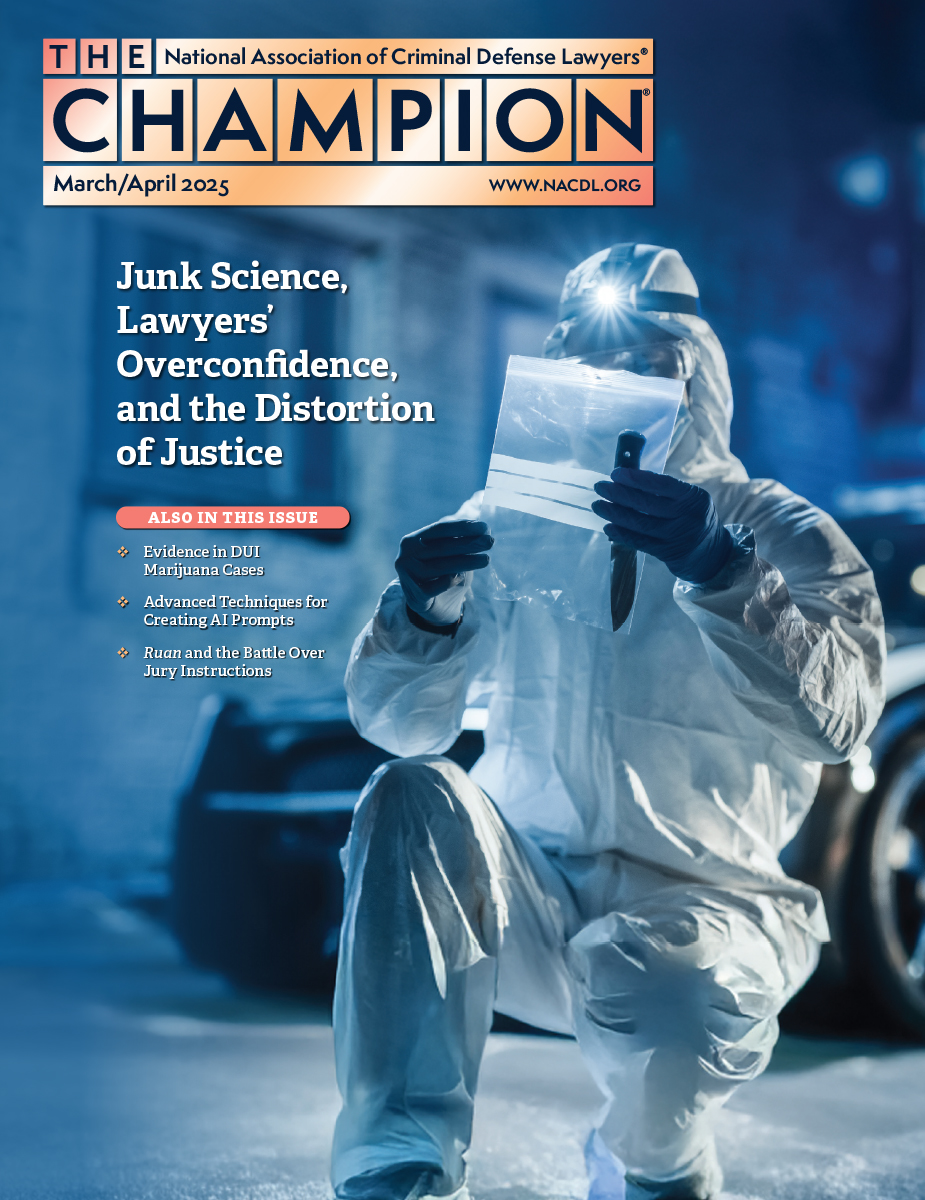Explore keywords to find information
RECENTLY ADDED & UPCOMING
-
The Champion

March/April 2025
What are the evidentiary implications of field sobriety tests in marijuana cases? Does the odor of marijuana give officers probable cause to search a vehicle?
-
Amicus Brief

Jenner & Block LLP v. U.S. Department of Justice
Brief of the National Association of Criminal Defense Lawyers and New York Council of Defense Lawyers as Amici Curiae in Support of Plaintiff’s Motion for Summary Judgment.
-
News Release

News Release ~ Opposition to Actions Against Law Firms
Nation’s Defense Bar Reiterates Opposition to Actions Against Law Firms – Washington, DC (March 18, 2025) – The National Association of Criminal Defense Lawyers (NACDL) remains deeply concerned over recent executive orders targeting law firms, most recently Paul Weiss and Perkins Coie, and repeats its call to uphold the right to counsel and the independence of the legal profession. Despite a ruling blocking the action against Perkins Coie, the administration has continued to target law firms representing disfavored clients and positions, threatening the right to a zealous defense.
-
Event

Trial Tactics for Pregnancy-Related Cases: Skills for Every Defender
LOCATION: The University of Texas School of Law, Austin, TX
DATE: May 16-17, 2025
COST: FREE (registration is required)
CLE Credit: Up to 14.5 credits -
Webinar

Collaborative Approaches to Appellate Defense: Recognizing Clients' Legal Expertise
WHEN: Thursday, May 8, 3:00-4:30pm ET / 12:00-1:30pm PT
CLE CREDIT: not available
COST: Free
Featured Products
-

Alcohol, Blackouts and Consent in Sex Cases
This comprehensive training program provides defense attorneys with a rigorous, science-backed approach to dismantling prosecutorial narratives, exposing unreliable testimony, and ensuring that juries are properly educated on the complexities of memory, intoxication, and consent. You'll explores critical mistakes and misconceptions encountered in these cases, including errors in memory reconstruction after an event, incorrect inferences, cognitive schemas, suggestibility, contamination and misinformation, mistakes of fact and more.
-

Overcoming the Presumption of Guilt and Defining Reasonable Doubt
Reasonable Doubt, what is it?
In order to win criminal cases, the defense practitioner must object to a reasonable doubt standard that lowers the burden of guilt. This program will discuss proven methods to argue and define reasonable doubt persuasively to a jury. You’ll learn how define reasonable doubt using metaphors and hypothetical scenarios that force juries to dispute the evidence, conflicts in the evidence, or even lack of evidence in your case.
-

The DIY of DNA: Exoneration Through DNA Evidence
This presentation might be the first time you’re truly able to truly grasp the fundamentals of DNA evidence. This critical presentation blends real-world storytelling with clear, practical instruction—making DNA evidence finally feel accessible, even to non-scientists—while inspiring attorneys to dig deeper, ask smarter questions, and approach forensic science with newfound confidence. You’ll learn how to identify and interpret electropherograms, understand autosomal vs. Y-STR testing, and recognize the limits of DNA evidence—particularly when it involves partial or mixed samples.
-

AI Rising: Integrating & Fighting the Use of Artificial Intelligence
This unique online training will discuss hot topics in AI, including how you might integrate these tools into your practice, use them ethically, and, how you might attack law enforcement’s use of AI tools to ensnare your clients. You'll also uncover e-discovery and combing through terabytes of data all the way to using ChatGPT to test cross-examination questions. These tools can generate content and reach conclusions.
-

A Defender's Guide to Federal Evidence - 2nd Edition
This brand-new 2nd Edition 2024 Guide to Federal Evidence is the only federal evidence handbook written exclusively for criminal defense lawyers. The updated 2024 Guide analyzes each Federal Rule of Evidence and outlines the main evidentiary issues that confront criminal defense lawyers. It also summarizes countless defense favorable cases and provides tips on how to avoid common evidentiary pitfalls. The 2nd Edition Guide contains multiple new and updated user-friendly flowcharts aimed at helping the criminal defense lawyer tackle evidence problems.

.png?ext=.png)

